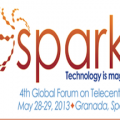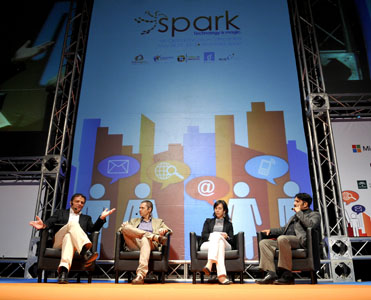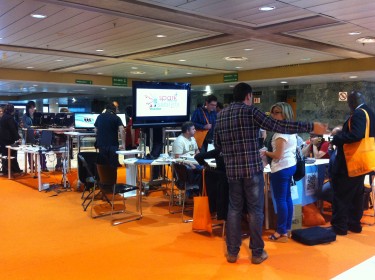Last week, Rising Voices attended the Spark Telecentre conference. We published an introduction to the conference here on the blog before we left. Here is an update of how it went.
When do you get librarians, cell phone providers, Microsoft, and agricultural extension programming in the same room?
In a busy conference center in the midst of Granada, a city surrounded by snow capped mountains and filled with palm trees, 1300 people came together to talk about their efforts to develop technologies to increase access to information around the world at the SPARK Telecentre conference.
 Speakers came from around the world and with a variety of different types of projects – but all with a similar goal of getting more people online and with access to information. Some of the major speakers were…
Speakers came from around the world and with a variety of different types of projects – but all with a similar goal of getting more people online and with access to information. Some of the major speakers were…
Leila Janah, from Samasource, using data services to get new jobs to provide a living wage around the world; Inveneo, delivering sustainable computing and broadband to the developing world for improved education and disaster relief; Eunice Gnay Namirembe from Text to Change, using mobile phones for development, as well as many others.

There were many diverse projects at Spark using different ways to reach a similar goal. Brenda Musoke was there representing her library in Uganda, which is a member of Beyond Access. Her library's work in education focuses on women (and through them, their husbands). I asked her how they keep people interested in and involved, and she said that sustainable involvement happens naturally; when a woman's friends see that she can use email and the internet, the friends start attending classes as well. Sometimes, this means teaching women how to read and write with a pen and paper, before even getting to computer classes. You can her more about the programming in the interview:
Beyond Access is an organization using library spaces to push for change around the world. As they say,
Development in the 21st century demands access to information… Most countries around the world, regardless of their size or level of development have public libraries. Beyond Access is starting a movement to make them all hubs for economic and social change. We believe that libraries power development.
The attitude of the conference was not so different from this idea, broadening the focus from libraries to telecenters : places where people can come together and access and learn about computers and digital resources.
Another representative at Spark was Romeo Rodríguez, from Xela Civic Libraries in Guatemala (a former recipient of Rising Voices Microgrant). The Xela Civic Library one of several projects of Riecken Communities Libraries. Romeo gave us an update about the project, and it what capacity it has been able to continue after the microgrant ended. He also told us about a youth program they are working on, which he spoke about at Spark 13:

There was also digital TV streaming in real-time during the conference – you can find that link still online.
The conference’s speakers dealt with a diversity of issues, from digital education, to getting more markets to farmers, to building new apps and technolgoical solutions. It was organized by division into “People,” “Innovation,” and “Sustainability.” At Rising Voices our focus led us to speak in that first category, and we joined a panel on Civil Society, speaking with the network organizers of telecenters in the MENA, and
– Latin American regions, Information Society Development Foundation from Poland, the organizers of the Erada Portal from Egypt which helps to address the needs of those with disabilities, and a project of GIZ operating in the Maghreb.
Many of the telecenters are organized through the Telecentre Foundation and then further, through regional networks
If you are working with a library/teleceter, get in touch wiht your regional organizer.
- MENA
– Europe
– Africa
– Latin America
– Asia Pacific
– Eurasia
Note: Audio hosting for this post was provided by radioteca, a free portal for sharing and hosting audio.




1 comment
The relationship between learning digital skills and physical, in-person connections within the community help to keep these classess going especially if the women use these skills to improve their lives and those of their families and show that getting close to or spending time in the library “sitting at a computer or accessing newspappers/ a book” is not a waste of time but actually an investment in the resource of knowledge which if applied to one’s life can improve it for the better. It changes the way other women who are not yet a part of the classes think especially when they realize that the literate women have better chances of getting ahead, are leading healthier and happier lives, and making something more of themselves than was the case before they started coming to the library for these classes.
Please let us know what else we could do to keep these women coming in in overwhelming numbers.